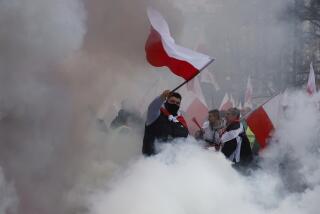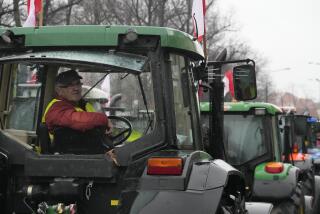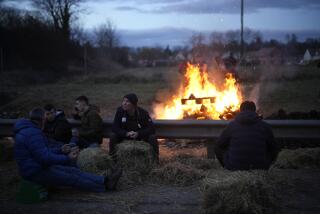‘Lies,’ Poland Says of Reported Strikes Over Government Meat Price Increases
- Share via
WARSAW — The Polish government Tuesday dismissed as lies opposition reports of scattered strikes in response to a call by the Solidarity union to protest higher meat prices.
“There were no strikes,” the government spokesman, Jerzy Urban, said at his regular weekly news conference. Reports to the contrary, he said, were “lies . . . based on unreliable sources.”
Opposition sources acknowledged that the response to the banned labor union’s call for a one-hour strike on Monday was generally sparse. They said it reflected fear among workers of government retaliation and a feeling that the authorities had no intention of rescinding a 10%-to-15% increase in the price of meat that went into effect on Monday.
The increases marked the final phase of consumer price boosts for 1985, which the government has spread out over a four-month period to dampen the prospects of worker protests. At least half the typical family budget in Poland is now spent on groceries, but the government contends that the increases are needed to bring prices into line with production costs and reduce massive state subsidies for food. Since 1982, food prices have risen by more than 150%, substantially more than wages.
First Since Late ’82
Although Solidarity leaders have threatened to organize limited work stoppages several times in the past three years, this was the first time since November, 1982, that the threat has been carried through. An attempt then to organize a general strike to protest the outlawing of the independent union brought only a tepid response from workers still stunned and demoralized by martial law, which was lifted in 1983.
Jacek Kuron, a leading Solidarity adviser, told Western reporters that 60% to 90% of workers in five departments of the huge Ursus tractor factory in Warsaw, a center of opposition sympathy, stopped work briefly on Monday. Kuron also said stoppages affected four departments of the Huta Warszawa steel mill in the capital and that one worker was detained by police.
Other Solidarity sources said the strike call was observed by several thousand workers at the Dolmel electric engine plant in Wroclaw and by 90% of workers in the Lenin shipyards in Gdansk, where the union was born in 1980 and where Solidarity leader Lech Walesa still works as an electrician. The sources acknowledged a generally sparse response elsewhere, however.
Foul-Smelling Substance
Urban, in his news conference, insisted that all such reports were fabrications, although he admitted that there were efforts to organize work stoppages. In one instance, he said, unknown persons hurled glass tubes of a foul-smelling substance into a work area at the Huta Warszawa steel mill but “work was not stopped.” Twenty shipyard workers tried to organize a strike at the Gdansk shipyards but failed, Urban maintained, adding that “even those who called the strike, even Walesa, worked.”
Walesa, under threat of prosecution for his continued union activities, issued an unusually circumspect statement on Monday in which he said, “I’m very satisfied with the shipyard workers’ attitude, and now I’m absolutely sure about the victory of the ideals of August, 1980,” when striking shipyard workers organized Solidarity.
While opposition sources attributed Monday’s general lack of response to police intimidation and a feeling that such protests are futile, the government spokesman said it reflected the workers’ common sense and a realization that higher food prices are an economic necessity.
Urban said he knew of no arrests in connection with the strike call. But he disclosed that the number of officially recognized political prisoners in Poland has grown to 195, 16 who have been sentenced to prison and 179 who are considered still under temporary arrest awaiting final disposition by the courts. The count includes four secret police officers convicted in the murder of Father Jerzy Popieluszko, on the ground that the murder of the pro-Solidarity priest was politically motivated.
Many Re-Arrested
Only a year ago, a broad amnesty virtually cleared Poland’s jails of political prisoners and led the Reagan Administration to suspend most of the economic sanctions it imposed in 1981 in response to the crushing of Solidarity under military rule. A number of leading Solidarity figures have since been re-arrested on charges of continuing political activity.
More to Read
Sign up for Essential California
The most important California stories and recommendations in your inbox every morning.
You may occasionally receive promotional content from the Los Angeles Times.













